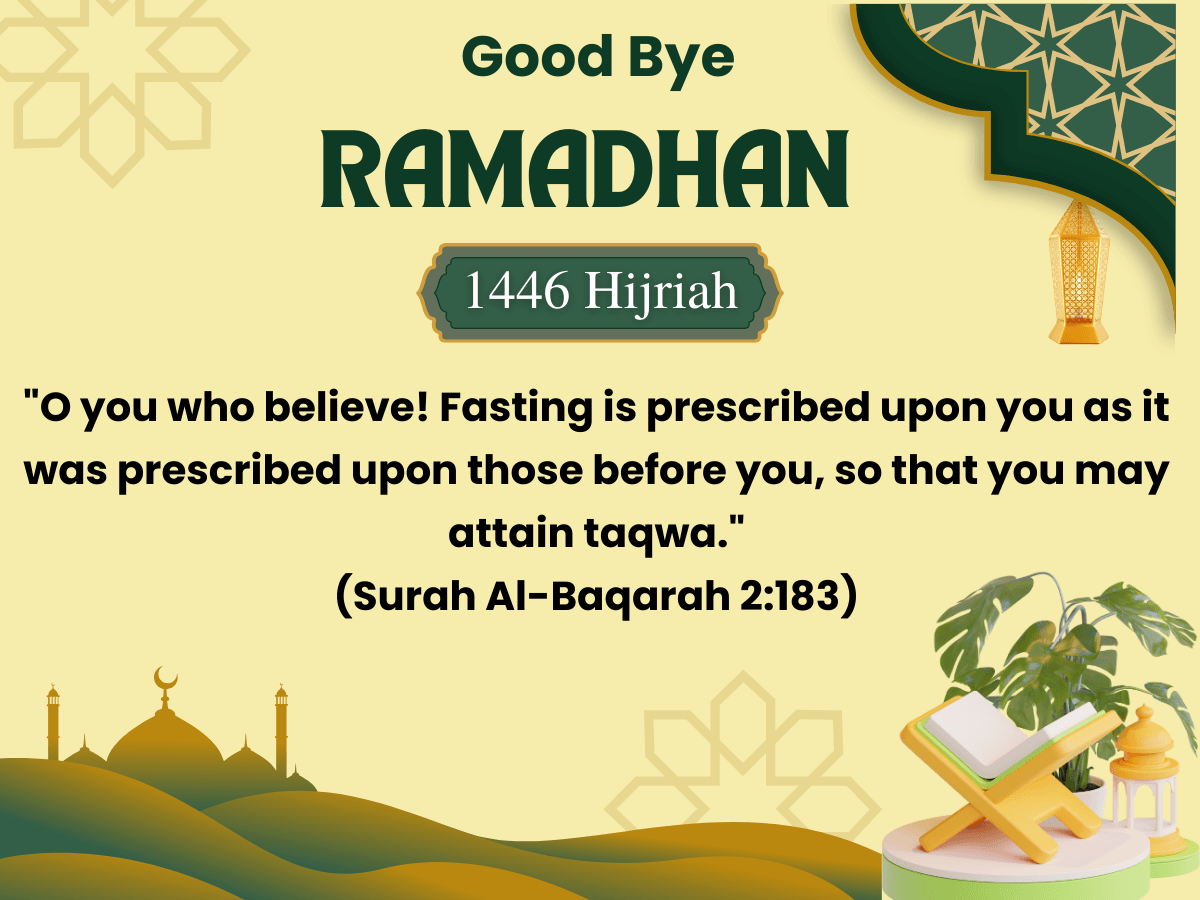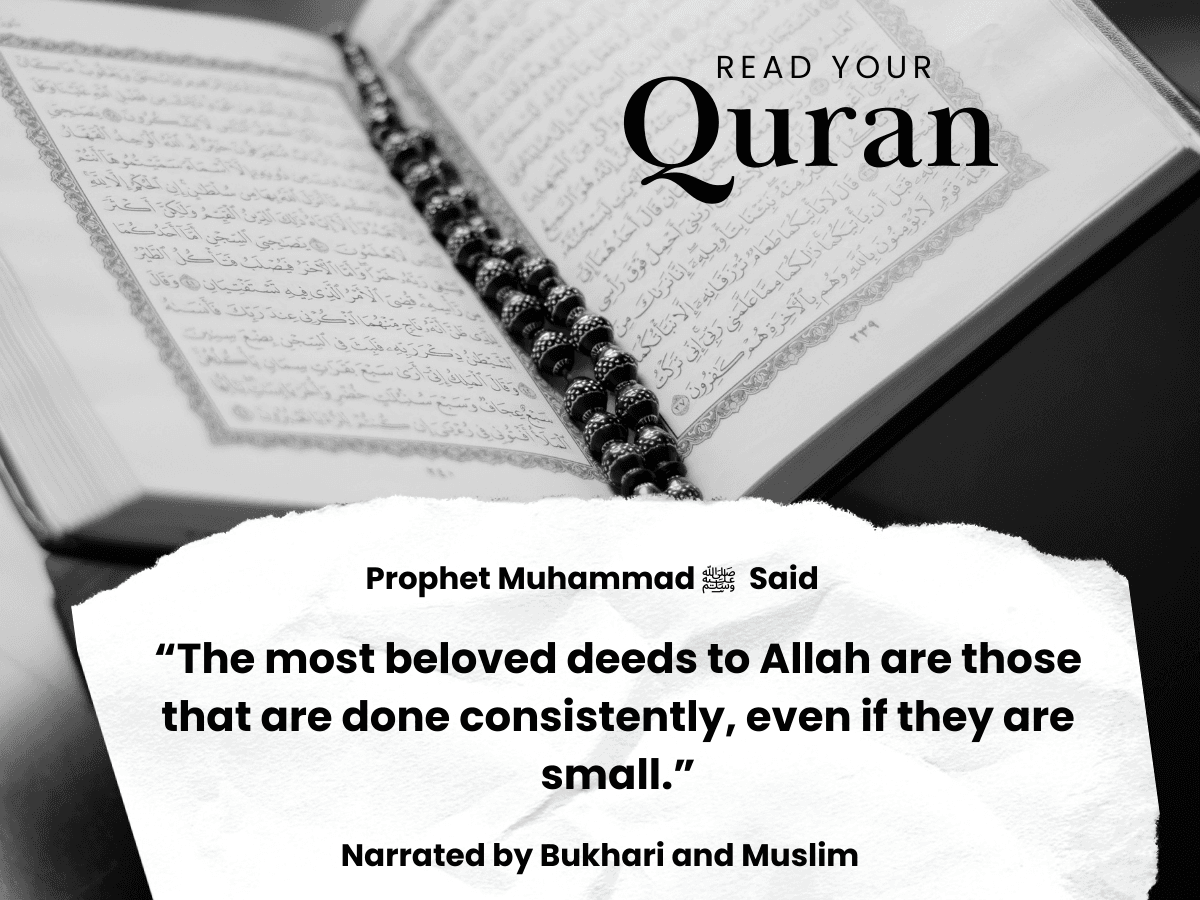“My brothers and sisters in Islam, this year Ramadan has left us, but the question remains “did our fasting, prayers, charity, and tears reach Allah? Or did we just go hungry for 30 days?” This is a question that should weigh heavily on the heart of every believer, which is why we are going to mention some signs of an accepted Ramadan fast.
Fasting during Ramadan is a tremendous act of worship, but the real success lies in whether it was accepted by Allah. Our Prophet (ﷺ) warned:
“There are people who fast and get nothing from their fast except hunger, and there are those who pray and get nothing from their prayer but a sleepless night.” (Sunan Ibn Majah 1690, Hasan)
So, how can you know if your Ramadan was truly accepted? What are the signs of an accepted Ramadan fasting that Allah has blessed you with?
Why do we need to check some of the signs of an accepted Ramadan fast in ourselves?
Dear brothers and sisters in Islam, as we are going to reflect on these signs of an accepted Ramadan fasting, we must humble our hearts with a crucial reminder that these signs are not certificates of approval. They are not guarantees that your fasting was accepted by Allah. And they are certainly not badges of pride to show off to others or get relaxed. Allah alone knows whose deeds are accepted.
One of our scholars, Imam Ibn al-Qayyim رحمه الله, warned us of a dangerous disease called ‘Al-Ujb (self-admiration), when a person begins to feel proud of his or her good deeds. This pride can destroy the sincerity that made the deed worthy in the first place. Imagine fasting a whole Ramadan with sincerity and effort, only to lose the reward after by thinking or saying,
“I’m better than others during Ramadan, I did this and that in so so amount of times more than others. I clearly had an accepted Ramadan.”
My dear brother, my dear sister, this is not the spirit of a true believer. The companions of our Prophet ﷺ would fast, pray, and give charity far beyond what we can imagine, and still fear whether Allah had accepted their deeds or not. Ibn Umar رضي الله عنه used to say:
“If I knew that Allah accepted even one sajdah (prostration) from me, I would wish to die right now.”
These signs of an accepted Ramadan fast are not meant to fill your chest with pride, they are just to encourage you, to motivate you, especially if you feel yourself relaxing too soon after Ramadan. Maybe you’ve slacked a bit in your extra salah, or you haven’t opened the Qur’an in a few days, or you don’t wake up for Tahajud anymore, and many more.
My dear brothers and sisters, before you ask yourself that “What are the signs that my Ramadan Fasting is accepted?” we must first understand the true purpose of fasting in Islam.
Allah did not command us to fast simply to hunger and thirst. Rather, He linked fasting to Taqwa, Consciousness, or piety, the ultimate goal of Ramadan fasting. It’s not about abstaining from food and drink alone, but about whether our fast brought us closer to Allah, increased our sincerity, and purified our souls. Allah says in the Qur’an:

“O you who believe! Fasting is prescribed upon you as it was prescribed upon those before you, so that you may attain taqwa.”
(Surah Al-Baqarah 2:183)
This verse tells us the end goal isn’t the fast itself but Taqwa, a deep-rooted God-consciousness that governs your decisions, your speech, your silence, and your inner state. If you finished Ramadan and feel more aware of Allah in your daily actions, that’s not a coincidence. It’s one of the first signs of an accepted Ramadan fast. Shaykh Ibn Uthaymeen رحمه الله said:
“The purpose of fasting is not merely to abandon food and drink, but to attain piety (taqwa). If a person’s fast does not lead him to leave off sin and increase in righteousness.”
So ask yourself, did Ramadan make me more careful with my tongue? Did I think twice before sinning, not out of fear of being seen, but fear of displeasing Allah? These are the internal signs that my Ramadan fasting is accepted. Let’s mention some of the signs of an accepted Ramadan fast.
Some signs of an accepted Ramadan fast
Let us always remember that even with all these signs, only Allah truly knows what is accepted. Acceptance is a matter of the unseen, but our Prophet ﷺ and our righteous predecessors did mention some things that our scholars are trying to derive these signs from.
These are not guarantees, they are indicators that, if you find these signs in you, do not take pride in them or feel relaxed, but just thank Allah and strive for continuity. If you lack some of these signs too, that’s an encouragement for your to be a better version of yourself. Some key signs that your Ramadan fasting was accepted include:
1. Increased Taqwa (God-Consciousness) after Ramadan
The entire objective of Ramadan, the hunger, the thirst, the night prayers, the Quran, all of it is meant to increase your God-consciousness. So if you’re asking, “What are the signs of an accepted Ramadan fasting?” or “What are the signs that my Ramadan fasting is accepted?” then increased taqwa is at the very top of the list. If after Ramadan, you find yourself:
- Still lowering your gaze and not watching haram content
- Not backbiting or gossiping around
- Performing your Solah at the right time with extra ones, reading the Quran, and doing Tahajjud
- Feeling uncomfortable in sinful environments
- And making sincere, quiet efforts to avoid displeasing Allah…
Then have hope, my brother, because these are not small changes. These are signs that your heart has absorbed the spiritual training of Ramadan. These are signs that Allah may have accepted your fast. Ramadan softens the heart if we fast with sincerity and consciousness. If your heart still carries that softness after Ramadan, it’s a sign that it was touched by Allah’s mercy, and you are on the right course.
Ibn al-Qayyim (رحمه الله) said:
“The sign of accepted worship is that it leaves you better than before—not that you return to old habits once Ramadan ends.”
2. You’re preparing for Shawwal fasts or hoping for the next Ramadan
My dear brothers and sisters, a soul that tastes the sweetness of closeness to Allah during Ramadan will never be satisfied when the month ends. It will yearn for more. And this yearning is among the clearest signs of an accepted Ramadan fasting.
When the Ramadan fasting ends, you will want to move to the next step, which is fasting in the six days of Shawwal. The Prophet ﷺ mentioned the virtue of the Shawwal fasting as:

“Whoever fasts Ramadan and then follows it with six days of Shawwal, it is as if he fasted the whole year.” (Narrated by Muslim)
SubhanAllah. What a gift from Allah. He knows that His true servants don’t want to stop worshipping once Ramadan ends. So He offers us a chance to continue, to keep the doors of reward wide open. And those who rush to fast the six days either consecutively or split across the month are often those whose hearts were moved, softened, and changed by Ramadan. Imam Ibn Rajab رحمه الله wrote:
“The sign of acceptance of a good deed is that it is followed by another good deed.”
So, if after Ramadan, you find yourself planning your six days of Shawwal, encouraging your family and friends too, or even preparing your body and mind to resume fasting, know this is a very strong sign that your Ramadan fasting was accepted.
It doesn’t stop there. Another powerful sign is if you’ve already started missing and thinking ahead to next Ramadan, perhaps making du’a to witness it, planning to do better, aiming to memorize more Quran before it comes. You’re also excited about other voluntary fasts too.
- The white days (13th, 14th, 15th of each lunar month)
- Considering Monday/Thursday fasts like the Prophet ﷺ used to do
- Looking forward to Ashura and Arafah
This type of thinking shows that your heart has tasted the sweetness of Ramadan and now wants to feel that nearness to Allah. And if you’re asking yourself, “What are the signs that my Ramadan fasting is accepted?”, this genuine eagerness to continue after Ramadan is one of the most sincere and hopeful indicators. Remember, Allah says:
“And those who strive for Us. We will surely guide them to Our paths. And indeed, Allah is with the doers of good.” (Surah Al-‘Ankabut, 29:69)
So keep striving. Let that longing guide you to more fasting, more Quran, more dua, more preparation. Let it carry you through Shawwal, through the rest of the year, all the way back to the next Ramadan, stronger and more ready than ever. This yearning, this planning, this refusal to stop is not a coincidence but one of the signs of an accepted Ramadan fasting.
3. Continuity in worship after Ramadan (Istiqamah)
One of the clearest signs of an accepted Ramadan fast is what happens after the month ends. Many people pray Taraweeh and Tahajjud every night in Ramadan, but abandon them in Shawwal. Many recite the Quran daily in Ramadan, but barely touch it afterwards. Many observe their Salah carefully and on time in Ramadan, but become lazy afterwards. So ask yourself…
“Am I among those who only worship Allah in Ramadan or among those whose worship is for Allah in every month?”
Our Prophet ﷺ said:

“The most beloved deeds to Allah are those that are done consistently, even if they are small.”
(Narrated by Bukhari and Muslim)
The above hadith is explaining to us “istiqamah,” steadfastness, even if the actions are small. A single drop of water falling continuously can turn into a pool. Likewise, a small, sincere deed done regularly can shape your heart into one that Allah loves.
This means when Allah accepts your fasting in Ramadan, He blesses you to continue doing good after Ramadan. You begin to long for the worship. You don’t need motivation to avoid sin, your soul naturally will just resist and hate it. That, dear reader, is not your own doing. That is Allah guiding you as a sign of His acceptance. This includes continuity in the worship like…
- Waking up for Tahajjud
- Reading the Quran frequently
- Observing your obligatory Salah on time and the voluntary ones
- Giving charity and helping the poor
- Going to lectures and striving to know more about the Deen and many other good deeds
So if you’re asking, “What are the signs that my Ramadan fasting is accepted?” then look at your post-Ramadan habits. Did you continue with some of the good deeds you began during the month? Are you still striving, even on low days, to keep your heart connected to Allah?
That quiet effort, that ongoing connection, is not small. It is one of the noblest signs of an accepted Ramadan fast.
4. A Heart that now hates sin and loves obedience
My dear brother, my dear sister, if there’s one place where the effects of a truly accepted Ramadan fasting can be most clearly seen, it is in the transformation of the heart. Allah didn’t command us to fast just for hunger or discipline. He told us the true goal in the Quran that…
“O you who believe! Fasting is prescribed for you as it was prescribed for those before you, so that you may attain Taqwa.” (Qur’an 2:183)
Taqwa begins in the heart, that is how your heart feels when you approach sin, and how it longs for obedience.
So when you find yourself after Ramadan withdrawing at the thought of disobedience, when your soul becomes restless in environments of sin, when you feel uncomfortable delaying a prayer, or you walk away from gossip because it now burns your conscience—then know that this, by the mercy of Allah, is a sign of an accepted Ramadan fasting. This means that the goal of Ramadan has had an effect in your heart.
You see, the heart of the fasting believer is supposed to go through a purification process during the month. You feed it with Quran, starve it of sin, train it with night prayers, and bathe it in dua. After the 29 days that we concluded, your heart changes. It becomes more alive. It hates to sin and is more in love with what pleases Allah. This is among the good signs of an accepted Ramadan fast. The Prophet ﷺ said:
“Beware! There is a piece of flesh in the body, if it becomes good (reformed), the whole body becomes good; but if it becomes corrupt, the whole body becomes corrupt. That piece is the heart.” (Bukhari & Muslim)
If this is your state after Ramadan, where you don’t just avoid sin but you despise it, and where you don’t just perform acts of worship but you crave them, then let your heart be filled with hope and strive to continue these acts. These are signs that Allah accepted your fasting and purified your heart.
Some might ask, “But I still fall into sin sometimes. Does that mean my Ramadan wasn’t accepted?”
No. Perfection is not the goal, change is.
Even if you slip into sin, the fact that it hurts your heart and you rush to repent… the fact that you miss the congregational prayer… the fact that your guilt makes you cry in secret, these are signs of a living, God-conscious heart. A heart that has tasted the sweetness of iman and doesn’t want to lose it. Abu Umamah reported that a man asked the Messenger of Allah ﷺ: “What is faith?” The Prophet ﷺ said,
“If you are happy with your good deeds and saddened by your bad deeds, you are a believer.” The man said, “O Messenger of Allah, what is sin?” The Prophet said, “If something waivers in your soul, you should leave it.”
Musnad Aḥmad 22166
It is now upon you to guard this heart. Protect it. Keep feeding it with dhikr, dua, Quran, and good company. Because when your heart is alive after Ramadan, it’s a sign that your soul did not just fast, it grew in faith.
As we come to the end of this discussion, I want to remind you of a beautiful saying from the scholars:
“Acceptance is seen in what follows the deed.”
If you come out of Ramadan more devoted to worship, more humble, more connected to Allah, then thank Allah. And if you feel like you didn’t do enough or your Ramadan itself wasn’t perfect… Then don’t despair. Allah’s mercy is vast, He is still calling you back to Him. He’s still offering you the chance to renew, repent, and try again. The mercy of Allah is boundless, and His doors are always open for the repentant.
Keep doing good deeds, no matter how small they may seem. Remember, the Prophet ﷺ said:
“The most beloved deeds to Allah are those that are consistent, even if they are few.” (Bukhari & Muslim)
So strive for consistency, my beloved. Renew your intention every day, turn to Allah in repentance, and make sure your heart remains attached to worship, no matter the time of year.
The goal is not to dwell on whether your fasting was accepted; it is to keep doing what brings you closer to Allah. Keep fasting. Keep giving. Keep praying. Keep seeking forgiveness. Keep being among the good company of believers.
May Allah accept our deeds, purify our intentions, and save us from arrogance and heedlessness. May He make us from those who are accepted and humble, those who keep striving for His pleasure with sincerity and fear of rejection. Aameen.






Be First to Comment